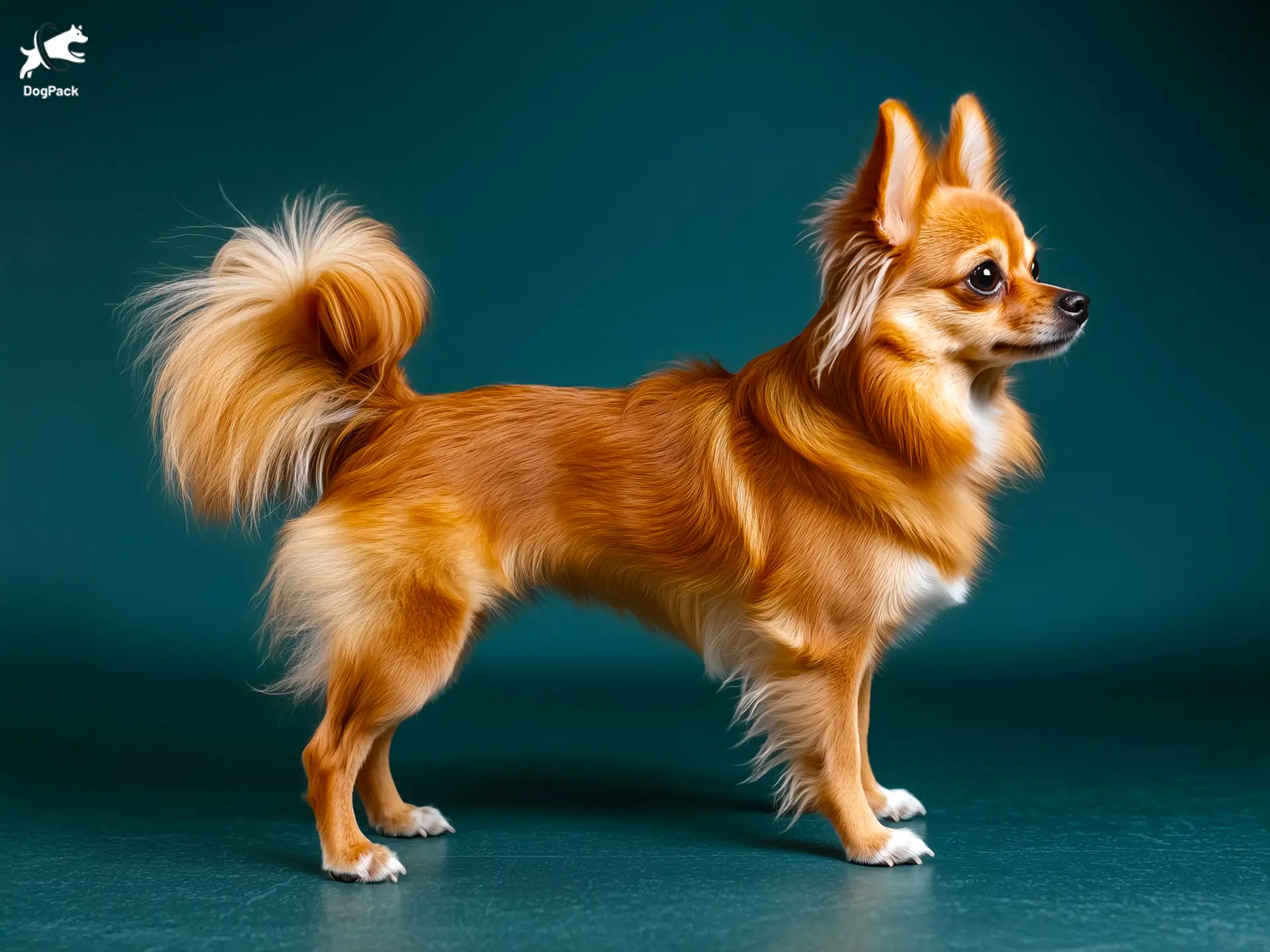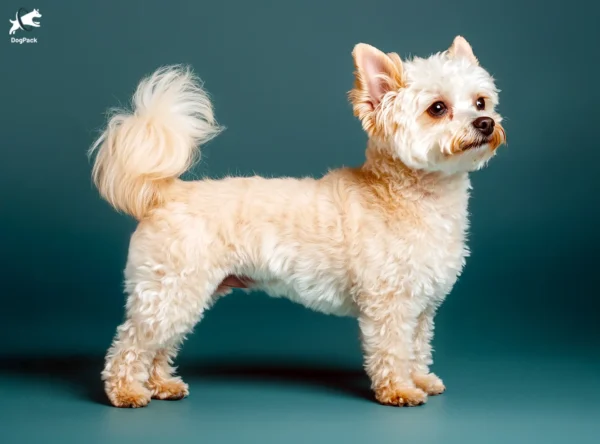Pomchi Dog Breed Info & Overview
If you’ve ever wished for a pint-sized companion with a whole lot of spunk, the Pomchi might be your dream come true. This playful cross between a Pomeranian and a Chihuahua isn’t just a pretty face—its affectionate nature and alert disposition make it stand out among small dog breeds. Expect plenty of cuddles, cheerful greetings, and a dash of sass from this adorable designer mix.
Characteristics
Pictures
Breed History
Although no one pinned down an exact date for when the first Pomchi popped up, this hybrid likely gained popularity in the United States during the rise of designer dog breeds in the late 20th century. Breeders were drawn to the playful charms of both parent breeds, hoping to combine the fluff of the Pomeranian with the feisty flair of the Chihuahua.
The Pomeranian brings a rich lineage dating back to the Arctic Spitz family, while the Chihuahua’s history traces to ancient Mexico. Enthusiasts embraced this petite mix for its loyal demeanor and lively personality. It didn’t take long for the Pomchi’s reputation to spread by word of mouth, as families and urban dwellers craved a compact companion dog.
Today, you’ll see Pomchi pups in cozy city apartments, suburban homes, and everywhere in between. Although they’re not officially recognized by major kennel clubs, organizations like the American Canine Hybrid Club acknowledge them. Over time, this cross has become beloved for its unique blend of looks and attitude, proving big hearts can indeed come in small, furry packages.
Temperament, Personality
Ever seen a little dog strut around like it’s ten times its size? That’s your average Pomchi—confident and utterly charming. While often described as spunky, these pups also possess a sweet and loyal side that bonds tightly with their favorite humans. They thrive on attention and can become quite attached, so be prepared for a constant furry shadow in your home.
Socialization is key for ensuring this tiny tornado behaves well around new people. With proper introduction, they can adjust to kids and other pets, though supervision is wise due to their small stature and tendency to get protective. Despite a playful and warm heart, they might bark at strangers first—then approach them for a friendly pat seconds later!
Offering mental stimulation—like puzzle toys or brief training sessions—prevents boredom. Pomchis love being the center of attention, so a game of fetch in the living room can delight them just as much as a romp in the yard. Their slightly bossy streak is part of the charm, especially if channeled into fun activities that let them show off.
Physical Characteristics
One glance at a Pomchi, and you’ll notice the signature fluffy coat inherited from the Pomeranian line, often paired with the expressive eyes and perky ears of a Chihuahua. Although small, their stance exudes confidence—like they’re aware of just how adorable they are. Many sport a fox-like face, while others lean more toward the “apple head” shape seen in Chihuahuas.
Coat textures can vary greatly, from short and smooth to plush and double-layered. Colors also run the gamut—think sable, cream, black, or even a blend of multiple hues. What doesn’t change is their compact form, typically weighing under a dozen pounds. Don’t let their size fool you: these pups often carry themselves as if they were large and in charge.
Proportionally, Pomchis can have slightly longer bodies or more rounded frames, depending on which parent’s genes come through stronger. Some inherit the Pomeranian’s plumed tail that curls over the back, giving them that extra fancy flair. Whether they have a longer muzzle or a squashed Chihuahua-like snout, the charm remains consistent—cute, alert, and always ready to turn heads.
Health Issues
Like many mixed dog breeds, Pomchis may benefit from “hybrid vigor,” but they’re still prone to specific health concerns. Dental issues can arise due to their small jaws and crowded teeth, so regular brushing is crucial. They may also inherit patellar luxation, a condition where the knee joint slips out of place, causing discomfort or lameness if untreated.
Tracheal collapse, where the windpipe weakens, can occur in toy-sized dogs. If your pup starts a honking cough or shows breathing difficulties, consult a vet immediately. Eye problems like cataracts or progressive retinal atrophy might also emerge. Keeping annual veterinary checkups ensures early detection, providing a better prognosis and quality of life for your beloved companion.
Preventive care goes a long way. A balanced diet, weight management, and plenty of gentle exercise help reduce stress on tiny joints. Consider scheduling routine blood tests for older Pomchis to catch early signs of organ issues. Staying aware of breed-specific vulnerabilities isn’t about worrying; it’s about equipping yourself to keep your furry friend spry and playful for years to come.
Grooming Needs
A Pomchi’s coat can be either short or luxuriously fluffy, and grooming demands vary accordingly. For the plush, Pomeranian-like coats, expect weekly brushing—daily during shedding seasons—to prevent tangles and mats. Those with a shorter Chihuahua coat still need a quick brush every few days to remove loose hair and keep that sleek shine.
Don’t skip the ears and nails: their upright ears can trap dirt, leading to infections, so gentle cleaning is recommended. Tiny paws need regular nail trims—overgrown nails can alter gait and cause discomfort. Bathing can be done monthly or when they get particularly grubby, but be sure to use mild, dog-specific shampoos to avoid irritating their sensitive skin.
Brushing a Pomchi is often a bonding experience. They typically adore the extra attention—just make sure you’re gentle, especially around the belly. Pay attention to the tail area, where mats might form if the hair is thick. After each grooming session, reward your pup with praise or a small treat; you’ll both come to enjoy this mini spa time.
Exercise Requirements
Pomchis may be small, but they’ve got spark! Daily walks of 20–30 minutes plus some indoor playtime can keep them satisfied. They love darting after toys or zipping around the yard. However, watch out for overexertion—those tiny legs tire quickly, and extreme weather can be tough, so shorter sessions are safer on very hot or cold days.
Mental stimulation helps channel their lively energy, so interactive games or puzzle feeders are fantastic. With a moderate energy level, they adapt to apartment living well, but still need outlets for curiosity. For example, try teaching them to perform fun tricks—like spinning or giving high-fives—to keep both mind and body active.
Monitor your Pomchi’s breathing during exercise, especially if they inherited the Chihuahua’s shorter snout. If you hear panting or coughing, let them rest and offer water. A comfortable harness, rather than a collar, helps protect their delicate trachea on walks. Above all, a balance of moderate exercise and cozy downtime is just right for this pint-sized dynamo.
Training Tips
Pomchis can be a tad headstrong, combining the stubbornness of the Chihuahua with the playful spark of the Pomeranian. Positive reinforcement is your secret weapon—praise, treats, and gentle guidance. Early socialization ensures they grow into friendly adults who aren’t yapping at every noise. Keep sessions short, upbeat, and consistent to hold their attention.
Potty training can pose challenges, as small dogs sometimes have smaller bladders and less patience for stepping outside in bad weather. Consider pee pads as a backup, especially during puppyhood. Patience is key: if accidents happen, calmly clean up and keep reinforcing the right spot. In time, your Pomchi will understand where and when to do their business.
Leash training is vital for safety, especially for these pint-sized pups who think they’re giant guardians. They can get feisty when seeing larger dogs, so gentle exposure to various sights and sounds helps. If your Pomchi barks excessively at passersby, distract them with a treat or toy before the barking starts. Consistency and a loving approach usually win them over.
Nutrition, Diet
Because Pomchis are prone to dental issues, opt for high-quality kibble formulated for small breeds, helping keep teeth clean. Aim for a protein-rich diet with balanced fats to maintain energy without adding unnecessary weight. Look for formulas specifically labeled “toy or small breed” to meet their nutritional needs—these often feature smaller kibble pieces that are easier on tiny jaws.
Portion sizes matter. Most Pomchis do well on about ½ to 1 cup of dry food per day, split into two meals. Keep an eye on weight: even a pound or two over can strain their joints. Adjust portions based on activity level—some Pomchis are perfectly content snoozing by your side, while others romp around enough to need a bit more.
Occasional treats are fine, but stick to healthy options like small, soft chews or freeze-dried meats. Avoid overindulging them with table scraps, which can upset their sensitive stomachs. If you notice digestive issues, switching to a grain-free or limited-ingredient formula might help, though always consult a vet before making significant dietary changes. A tailored diet keeps that sassy spirit shining bright.
Adoption, Breeders
For those seeking a Pomchi, start by checking local rescues or shelters that focus on small breeds. You can also connect with owner communities like the Pomchi Love Facebook Group for rehoming opportunities and advice. Adopting can be a rewarding way to welcome a Pomchi into your life while giving a deserving pup a second chance.
If you choose to go through a breeder, look for one who prioritizes both health and temperament. Ask to meet the parent dogs and request health clearances to rule out hereditary conditions. A supportive community like the Pomchi Pups Facebook Group can also help you connect with ethical breeders and get real-world advice from experienced owners.
Steer clear of puppy mills or vague online listings advertising “teacup” Pomchis. This breed is naturally small and doesn’t require exaggerated breeding. Reputable sources will provide health records, answer questions, and be transparent about their practices. Taking the time to research ensures you bring home a happy, well-adjusted dog that fits your lifestyle and family.
Family Pet?
Pomchis can be fabulous family pets, especially for households with older children who understand how to handle a delicate pup. Their enthusiastic greetings and snuggly nature endear them to those who appreciate a lively companion. They’re generally friendly but can be a bit defensive when startled or overwhelmed, so respectful interactions are crucial.
Introducing a Pomchi to other pets typically goes smoothly if done gradually. Small dog syndrome can pop up, but gentle socialization helps them coexist with bigger canines or even cats. The main challenge is their tendency to bark when excited, which can amuse some families and annoy others—consistency in training can help tone down that canine commentary.
For families seeking a cuddly lap buddy who’ll still chase a toy around the living room, this breed is a sweet option. Ensuring kids learn safe handling is paramount: Pomchis’ tiny frames can’t withstand rough play. In return, these pups bring unwavering devotion, comedic antics, and enough cuteness to fill every corner of the home.
Right For You?
If you’re in the market for a dog with big personality packed into a small body, the Pomchi could be a match. They thrive in apartments living but need consistent training and socialization. Consider your schedule—these pups adore being the center of attention and may grow anxious if left alone for long periods.
Individuals looking for a low-shedding, no-fuss dog might want to think twice, as moderate grooming is part of Pomchi ownership. Yet, the payoff is huge: an entertaining, loyal companion that can adapt to various lifestyles. Whether you’re a retiree craving a cozy lap dog or a small-family household with older kids, this spirited hybrid can bring endless smiles.
Ultimately, choosing a Pomchi means embracing a bit of vocal drama, a dash of stubbornness, and a whole lot of heart. If you’re ready to dedicate time to proper care, socialization, and daily fun, you’ll be rewarded with unwavering devotion and countless charming moments. In the right environment, Pomchis flourish as delightful sidekicks, brightening everyday routines with their sweet presence.
Conclusion
Wrapping up, the Pomchi is a spark of joy in a compact, fluffy package. This blend of Pomeranian poise and Chihuahua tenacity demands patience in training and moderate grooming but rewards you with loyalty and endless entertainment. If you’re seeking a lively, snuggly buddy who can thrive in close quarters, this mix might just be the perfect fit for your home.
FAQs
-
What makes the Pomchi’s personality different from a pure Pomeranian or Chihuahua?
The Pomchi blends the sass of a Chihuahua with the playful charm of a Pomeranian, creating a dog that’s bold yet affectionate. It tends to be less yappy than a Chihuahua but more alert and independent than a typical Pomeranian.
-
Do Pomchis prefer one person or bond with the whole family?
The Pomchi often forms a strong attachment to one person, showing loyalty and protectiveness. While it can be affectionate with others, this breed mix is known to choose a “favorite human” and may follow them everywhere like a tiny shadow.
-
How much stimulation does a Pomchi need during the day?
Though small, the Pomchi needs consistent mental stimulation to avoid boredom. Puzzle toys, short training sessions, and interaction breaks throughout the day help prevent small dog anxiety and attention-seeking barking.
-
Can a Pomchi travel well in-cabin on flights?
Yes! Due to their size, Pomchis are small enough for airline-approved pet carriers, making them ideal travel companions for in-cabin flights. Always check airline guidelines for under-seat dimensions and health requirements before booking.
-
Is there a big difference between a long-haired and short-haired Pomchi?
Yes — long-haired Pomchis require regular brushing to prevent mats, while short-haired Pomchis shed more visiblybut need less grooming. Temperament tends to be similar, but coat length can influence appearance and maintenance routines.
Breed Ratings
The Pomchi is smart and quick to learn, especially when lured by treats and praise.
They adore interactive games and can stay amused with toys or brief zoomies around the living room.
Moderate bursts of energy are common, balanced by a love for cuddly downtime.
Fluffier coats can shed moderately, requiring routine brushing to keep fur in check.
A mild chasing instinct can pop up, but it’s usually short-lived.
Regular brushing and occasional baths are needed, but it’s manageable.
They can be a tad stubborn, yet respond well to positive reinforcement.
Extended solitude may lead to anxiety or boredom-induced barking.
Expect some talkativeness—these petite pups love to announce their presence.
Drooling is typically minimal, so owners won’t need many slobber towels.
With proper socialization, they coexist well but might be wary of bigger dogs.
Generally robust, but watch out for joint, dental, and respiratory issues.













